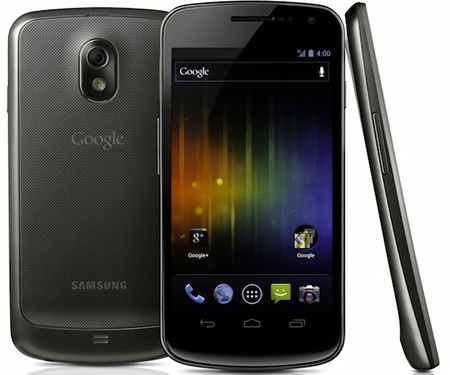Galaxy Nexus ships on Verizon, bringing ‘Ice Cream Sandwich’ to U.S.
Dec 15, 2011 — by LinuxDevices Staff — from the LinuxDevices Archive — viewsVerizon Wireless began selling Samsung's Galaxy Nexus smartphone for $300 on contract Dec. 15, allowing those awaiting the coveted gadget to exhale. The Galaxy Nexus offers a dual-core, 1.2GHz processor, 4.65-inch Super AMOLED display, 32GB of storage, dual cameras, and an NFC (near field communication) chip — but Verizon won't let the latter support the Google Wallet payment service.
Android phone fans have craved the Galaxy Nexus since Samsung announced the phone in Hong Kong in October. When it launched in the U.K. in November, the Galaxy Nexus was the first shipping device based on Google's Android 4.0 ("Ice Cream Sandwich") operating system.
Powered by a 1.2GHz, dual-core processor, the Galaxy Nexus sports a 4.65-inch, 1280 x 720 pixel Super AMOLED display, and 4G LTE (Long Term Evolution) cellular service. The handset also features 1GB of RAM and 32GB of onboard storage.

Samsung's Galaxy Nexus, showing Google+ integration
A mobile Hotspot capability lets users share a 4G LTE or 3G connection with up to 10 Wi-Fi-enabled devices for $30 a month. Verizon's 4G service is now available in over 190 markets, says the carrier.
Gadget geeks have been raving about the device and its Android 4.0 platform, which offers software navigation buttons and better multitasking capabilities. There's also an Android Beam app that lets two phones exchange information via the Nexus' NFC (near field communication) chip, as well as facial recognition software that lets users unlock their phones.
The Galaxy Nexus also features a "People" app that lets users browse photo profiles of friends, family, and coworkers, and check their latest status updates from social networks such as Facebook and Google+. In a strategic move designed to drive more users to Google+, Google has designed the phone so that users who aren't already on Google+ may create an account right from the phone.
Another featured Google app is Google Music, which lets users upload up to 20,000 songs to the cloud and buy tunes from Android Market.
Stolen Wallet
Verizon was supposed to begin selling the Galaxy Nexus in the U.S. Dec. 9, but the launch was reportedly delayed due to sticky negotiations over the Google Wallet mobile payment app, which Verizon asked Google to omit on the Nexus. Verizon took issue with the app's ability to secure user data.
Google countered that Wallet, which stores data on the phone's NFC chip, was plenty secure. Yet, Wallet is not included on the Galaxy Nexus launching today.
Verizon may have a point. On Dec. 12, ViaForensics released a report claiming that Google Wallet users can be at risk for financial or identity theft because some sensitive information is stored unencrypted. However, the risk wasn't exposure of the credit card number, according to the research firm, but rather that a customer's personal data, such as transaction history, was exposed.

Galaxy Nexus
The Galaxy Nexus will only have about nine days worth of pre-Christmas sales to try to steal some of the Apple iPhone 4S' thunder. Samsung has gone directly after Apple with a clever marketing campaign that makes fun of iPhone fans.
Like other 'Nexus' branded phones used to showcase new Android builds, Samsung's latest version offers a "pure Google" experience free of UI layers such as Samsung's TouchWiz. The phone will likely have a smartphone monopoly on Android 4.0 in the U.S. for at least several weeks. However, an ICS upgrade is already available for the new, four-inch Huawei Honor phone in parts of Asia, according to a Dec. 12 report from AndroidCommunity.
Galaxy and Android sales soar, but security, fragmentation still at issue
The Galaxy Nexus should help to continue Android's advance in smartphone market share, which has been boosted by strong sales of Samsung's Galaxy S and Galaxy S II smartphone lines. Verizon was the only large U.S. carrier not to offer the S II, deciding instead to focus its fall marketing efforts on the Motorola Droid Razr, which is set to get an Android 4.0 upgrade early next year.
According to Samsung this week, the company broke its own sales record by selling 300 million handsets — and counting — in 2011. The vast majority of these were said to have been Android phones, although sales of phones running its Bada operating system have done well in Europe, says the company. (Bada phones are not available in the U.S.)
According to an NPD research report released Dec. 13, Android now owns more than half the U.S. smartphone market, at 53 percent. Apple's iOS trails in second place at 29 percent.
As usual, however, Android has its troubles, too. Once again, security problems on Android Market became an issue this week as Google removed cloned versions of popular games such as "Angry Birds" and "Need for Speed." The fake games were said to contain malicious code that forces phones to send SMS messages to premium rate numbers.
Meanwhile, the ongoing controversy over Carrier IQ's alleged keystroke snooping appears to be largely an Android phenomenon. This week, the FBI denied a Freedom of Information Act request for information the agency has on Carrier IQ, and the beleaguered startup continued to assert its tool is not a keylogger, but just an aggregate data monitoring tool.
Finally, according to a Dec. 13 Flurry report, new application development projects for iOS outnumber those for Android approximately three-to-one. The differential is said to be due to iOS' easier development environment and lack of fragmentation, as well as its superior app store and developer payment process.
Availability
The Samsung Galaxy Nexus is available now in Verizon retail stores and online at Verizon Wireless' Galaxy Nexus page for $300 plus a two year contract. Customers must also snag a Verizon Wireless Nationwide Talk plan beginning at $40 monthly access and a smartphone data package starting at $30 a month for 2GB of data.
Clint Boulton is a writer for eWEEK. Eric Brown also contributed to this report.
This article was originally published on LinuxDevices.com and has been donated to the open source community by QuinStreet Inc. Please visit LinuxToday.com for up-to-date news and articles about Linux and open source.